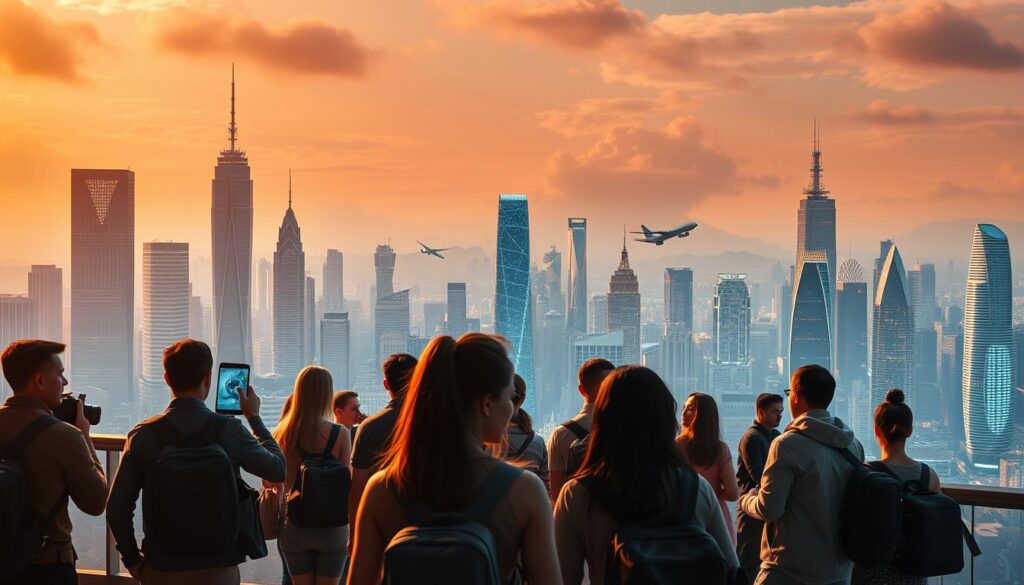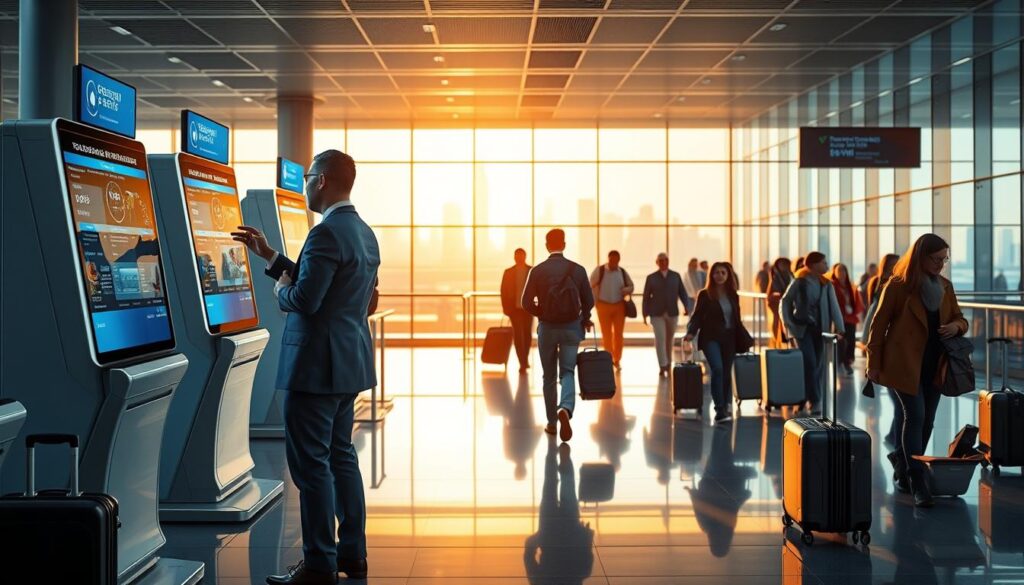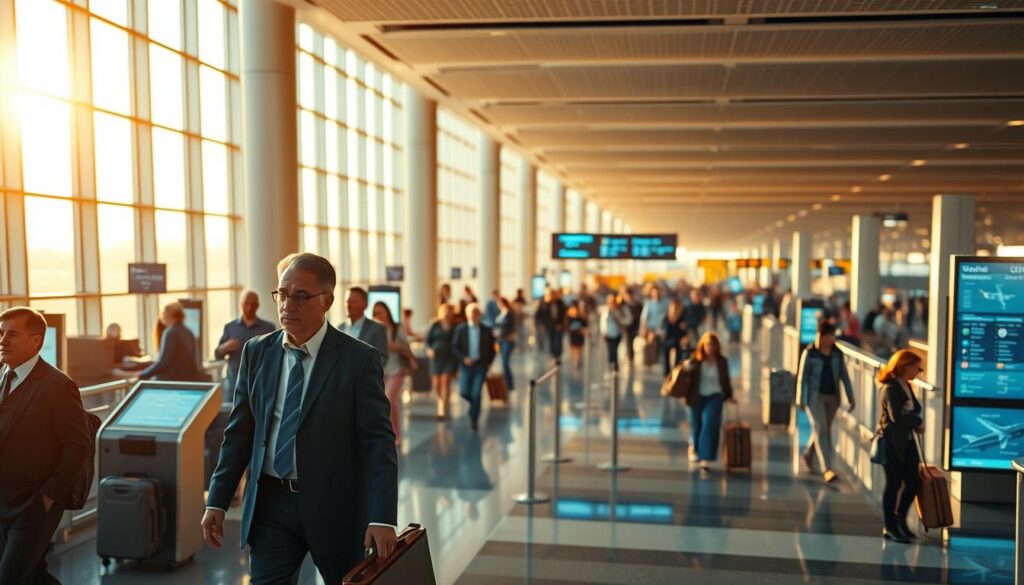“The best way to predict the future is to invent it,” said Alan Kay, a pioneer in computer science. This sentiment perfectly captures the transformative power of artificial intelligence in reshaping the travel and tourism sector. From booking to personalized recommendations, AI is driving innovation and efficiency like never before.
Generative AI is supercharging the industry, enabling companies to streamline operations and enhance customer experiences. For instance, platforms like Kayak and Expedia are leveraging AI to offer tailored suggestions and automate routine tasks. This not only saves time but also ensures a seamless journey for travelers1.
AI-powered systems are also improving safety and resource optimization. Real-time data integration allows for instant updates on weather, health advisories, and local safety reports, ensuring travelers stay informed and secure2. Moreover, predictive analytics are boosting booking conversion rates by anticipating customer needs3.
While AI enhances efficiency, it doesn’t replace human agents. Instead, it empowers them by handling repetitive tasks, allowing professionals to focus on delivering exceptional service. This synergy between technology and human expertise is redefining the industry.
Key Takeaways
- Artificial intelligence is transforming travel operations, making them more efficient and personalized.
- Generative AI is driving innovation, from booking to real-time problem-solving.
- AI enhances safety by integrating real-time data and providing alerts.
- Human travel agents are empowered, not replaced, by AI technologies.
- Customer satisfaction is increasing due to personalized and timely services.
Introduction to AI in the Travel Industry

Smart technologies are redefining how businesses and customers interact in the travel space. From booking flights to planning itineraries, intelligent systems are making the process faster and more efficient. This shift is not just about convenience; it’s about creating a seamless experience for everyone involved.
Definition and Scope of AI in Travel
Artificial intelligence in the travel sector refers to the use of advanced technologies like machine learning, natural language processing (NLP), and data analytics. These tools help businesses understand customer needs and provide tailored solutions. For example, platforms like Booking.com and Expedia use AI-powered chatbots to assist with bookings, ensuring a smooth experience4.
AI also plays a crucial role in fraud detection and security. By analyzing patterns and anomalies, these systems protect both customers and businesses from suspicious activities5. This level of protection is essential in an industry where trust is paramount.
The Rise of AI Technology in Tourism
The travel industry is witnessing a surge in AI adoption. Companies like Hopper use AI to predict optimal flight prices, helping travelers save money4. Similarly, hotels like The Dorchester Collection leverage AI to process customer feedback, ensuring high satisfaction levels4.
Personalized recommendations are another major benefit. AI algorithms analyze user preferences to suggest destinations, activities, and accommodations. This level of customization enhances the overall experience, making every trip memorable5.
As the industry evolves, AI continues to streamline operations. From dynamic pricing strategies to real-time assistance, these technologies are setting new standards for efficiency and customer service6.
Evolution of AI in the Travel Sector

The travel sector has undergone a remarkable transformation over the decades, driven by technological advancements. From manual processes to intelligent systems, the industry has embraced innovation to meet evolving customer needs.
Historical Perspective and Milestones
In the early days, travel planning relied heavily on manual processes. Agents used printed brochures and phone calls to book flights and accommodations. The advent of online booking systems in the 1990s marked a significant milestone, making the process faster and more accessible7.
Predictive pricing emerged as another game-changer. Platforms like Hopper began using machine learning to forecast flight prices, helping travelers save money7. These innovations laid the foundation for today’s advanced solutions.
Key Innovations Leading to Today’s Technologies
Modern travel technology leverages data and process automation to enhance efficiency. AI-powered chatbots now handle tasks like flight searches and hotel reservations, streamlining the booking process7.
User learning and intelligence play a crucial role in personalization. AI algorithms analyze preferences to suggest destinations and activities, creating tailored experiences8. This shift has redefined customer expectations, emphasizing convenience and customization.
From real-time updates to dynamic pricing, these innovations reflect a commitment to improving the travel experience. As the industry continues to evolve, the focus remains on delivering smarter, more efficient solutions.
How AI Agents Are Revolutionizing the Travel and Tourism Industry

Modern technology is unlocking new possibilities for seamless and personalized journeys. From booking flights to optimizing itineraries, advanced tools are transforming the way travelers plan and execute their trips. These innovations are not just about convenience; they are redefining the entire travel experience.
Breakthrough Technologies and Their Impact
Generative AI and real-time data analysis are at the forefront of this transformation. Companies like Kayak and Expedia are integrating these technologies to streamline operations and enhance customer satisfaction9. For instance, AI-powered dynamic pricing analyzes demand and seasonality to optimize costs for travelers10.
Predictive analytics is another game-changer. By analyzing historical data and market trends, these tools help travelers make cost-effective bookings and avoid last-minute price hikes11. This not only saves money but also reduces stress during the planning process.
Examples of AI Agents in Action
AI chatbots and virtual assistants are becoming indispensable tools for travelers. KAYAK’s integration with ChatGPT allows users to ask detailed questions and receive instant, data-driven answers10. Similarly, Expedia’s AI assistant, Romie, functions as a travel agent, concierge, and personal assistant, offering real-time updates and flagging disruptions10.
These tools are also enhancing user engagement. AI-powered recommendation engines suggest attractions and experiences tailored to individual preferences, making every trip unique11. This level of personalization is driving higher satisfaction and conversion rates across the industry9.
From itinerary optimization to 24/7 support, AI agents are proving to be invaluable. They handle routine tasks like booking and rebooking, allowing human agents to focus on complex interactions and creating value-added experiences11.
Impact on Customer Experience and Personalization

Personalization is reshaping the way travelers interact with services, creating more meaningful and tailored experiences. By leveraging advanced algorithms, companies can now offer suggestions that align with individual preferences, making every journey unique.
Tailored Travel Recommendations
AI algorithms analyze user behavior, past bookings, and preferences to deliver customized suggestions. For example, platforms like Marriott International use chatbots to streamline bookings and offer personalized options12. This approach not only enhances satisfaction but also increases conversion rates by 20%13.
Travel agents are also benefiting from these insights. By integrating AI tools, they can craft unique itineraries that cater to specific needs, ensuring memorable experiences for their clients.
Enhancing Customer Service Through AI
Chatbots and virtual assistants are transforming customer service in the travel industry. These tools provide 24/7 support, answering queries and resolving issues in real-time13. For instance, Marriott’s “Bonvoy Chat” assists guests with bookings and offers tailored recommendations, improving overall satisfaction12.
AI also helps businesses manage resources efficiently. By analyzing real-time data, companies can optimize logistics and ensure smoother travel experiences for their customers13. This level of service is particularly beneficial for both leisure and business travelers, who expect seamless interactions.
For more insights on how technology is transforming industries, explore AI trends in finance.
AI-Powered Itinerary Planning and Booking Innovations

Innovative tools are reshaping the way travelers plan and execute their trips, offering unprecedented levels of convenience. These advancements are not just about efficiency; they are about creating a seamless and personalized experience for every journey.
Real-Time Itinerary Customization
Real-time itinerary customization is one of the most significant breakthroughs in travel planning. AI-powered platforms analyze user preferences and behavior to suggest destinations, activities, and accommodations that align with individual needs14. This level of personalization ensures that every trip is unique and tailored to the traveler’s interests.
For example, platforms like Navan use generative AI to adjust itineraries dynamically based on real-time data, such as weather conditions or flight delays15. This flexibility allows travelers to make informed decisions and avoid disruptions, enhancing their overall experience.
Streamlined Booking and Reservation Processes
Booking and reservation management has become more efficient thanks to AI-driven tools. These systems automate routine tasks, such as searching for flights and hotels, reducing the time and effort required for planning15. For instance, AI-powered chatbots handle inquiries and bookings 24/7, ensuring a smooth process for users14.
Dynamic pricing is another key feature. AI algorithms analyze demand, competition, and user data to adjust rates in real-time, optimizing costs for travelers14. This approach not only saves money but also ensures that users get the best value for their trips.
For more insights on how technology is transforming industries, explore AI tools in interior design.
Role of AI in Corporate Travel Management

Artificial intelligence is reshaping corporate travel by automating complex processes and enhancing decision-making. Companies are leveraging advanced tools to streamline operations, reduce costs, and ensure compliance with travel policies. This transformation is not just about efficiency; it’s about creating a seamless experience for employees and finance teams alike.
Optimizing Policies and Expense Reporting
AI plays a crucial role in enforcing travel policies and simplifying expense reporting. Automated systems analyze receipts and match them to expenses with orders of magnitude better accuracy than traditional methods16. This reduces human error and saves time, allowing finance teams to focus on strategic tasks.
For example, generative AI tools like Altour’s AI Transform help travel managers create persuasive content to improve policy compliance16. These systems also provide real-time insights into spending patterns, enabling companies to optimize budgets and reduce unnecessary costs17.
Large language models simplify policy comprehension and fare rule interpretation, making it easier for business travelers to adhere to guidelines16. This level of automation ensures smoother operations and better resource allocation.
Data-Driven Insights for Travel Management
AI-powered tools analyze vast amounts of data to provide actionable insights. Predictive analytics helps companies anticipate travel disruptions and adjust plans accordingly16. For instance, Altour’s AI Predict tool alerts travelers about potential delays, ensuring minimal disruption to their schedules16.
These insights also help finance teams track and manage travel spending more effectively. By identifying trends and anomalies, companies can make informed decisions that align with their budgets17. This proactive approach reduces costs and enhances operational efficiency.
As AI continues to evolve, its impact on corporate travel management will only grow. From automating routine tasks to providing real-time insights, these technologies are setting new standards for efficiency and compliance.
Benefits of AI Travel Agents for Business and Leisure

Efficiency and cost savings are at the core of modern travel solutions, driven by intelligent tools. These innovations are transforming how both leisure and corporate travelers plan and execute their trips, offering unparalleled convenience and value.
Streamlined Operations and Cost Savings
Intelligent travel tools significantly reduce search times by analyzing vast amounts of data quickly and accurately. Platforms like Hopper and Navan use these tools to provide instant travel options, saving users both time and money18.
For businesses, these solutions automate expense reporting and ensure policy compliance. This not only reduces operational costs but also minimizes errors, allowing finance teams to focus on strategic tasks19.
Dynamic Recommendations and Adaptability
These tools adapt to change by offering dynamic recommendations based on real-time data. For example, they can alert travelers about price fluctuations, helping them book at optimal times18.
Corporate travelers benefit from predictive analytics, which anticipate disruptions and adjust plans accordingly. This ensures smoother operations and better resource allocation19.
From reducing search times to automating expenses, intelligent travel tools are proving to be indispensable. They enhance efficiency, lower costs, and adapt to the ever-changing needs of travelers. For more insights on how these technologies are reshaping the industry, explore AI in travel and tourism.
Integration of Generative AI and Future Trends

The travel industry is on the brink of a technological revolution, with generative AI leading the charge. From personalized recommendations to seamless booking processes, these advancements are transforming how travelers plan and experience their journeys. The integration of cutting-edge tools is setting new standards, making every trip more efficient and enjoyable.
Emerging Technological Enhancements
Generative AI is driving innovation across the sector. Platforms like Kayak and Expedia are using these tools to offer hyper-personalized suggestions based on customer preferences and real-time data20. This level of customization enhances satisfaction and boosts conversion rates significantly9.
IoT integrations and VR-based tours are also gaining traction. These technologies provide immersive experiences, allowing travelers to explore destinations virtually before booking21. Blockchain innovations are improving transparency and security, ensuring trust in every transaction20.
Predicted Growth and Market Shifts
The global market for generative AI is projected to grow from $11 billion in 2023 to nearly $52 billion by 2028, reflecting a compound annual growth rate of 33.4%20. This growth is fueled by increasing demand for personalized and efficient travel solutions.
Travel companies are leveraging predictive analytics to anticipate customer needs and adjust offerings dynamically21. Proactive disruption management and real-time pricing are becoming standard features, ensuring smoother experiences for travelers9.
As these trends evolve, customer expectations will continue to rise. The focus will shift towards creating unique, memorable journeys that cater to individual preferences20. This transformation is not just about technology; it’s about redefining the future of travel.
AI-Driven Customer Service Enhancements
Customer service in the travel sector is evolving rapidly, thanks to advanced technologies that streamline interactions and improve user experiences. Intelligent systems are now handling a significant portion of support requests, ensuring faster resolutions and greater satisfaction.
Chatbots and Virtual Assistant Capabilities
AI-powered chatbots are transforming how users interact with travel platforms. These tools can handle up to 60% of support requests, providing instant answers to common inquiries and freeing up human agents for more complex tasks22. With natural language processing, they understand traveler intent and deliver quick, accurate responses22.
Virtual assistants go a step further by proactively assisting with tasks like check-ins and activity suggestions. They analyze customer data and travel history to offer personalized recommendations, enhancing the overall experience22.
24/7 Support and Real-Time Updates
One of the standout features of AI-driven systems is their ability to provide 24/7 support. Travelers can receive real-time updates on flight delays, room availability, and booking confirmations, ensuring they stay informed throughout their journey23.
These systems also reduce query resolution times significantly. By instantly accessing databases, they deliver answers faster, improving efficiency and customer satisfaction22. Businesses report an 80% increase in satisfaction rates after adopting these tools23.
With AI, travel companies can manage disruptions more effectively. Real-time notifications and dynamic adjustments ensure smoother experiences, even when plans change unexpectedly23.
Overcoming Challenges in AI Adoption for Travel
Adopting advanced technologies in the travel sector comes with its own set of challenges, requiring careful navigation. From safeguarding sensitive datum to maintaining a human connection, businesses must address these concerns to ensure successful integration.
Addressing Data Security and Compliance Issues
One of the primary concerns is data security. With approximately 60% of hotel guests expressing concerns about privacy, companies must prioritize safeguarding consumer information24. Compliance with regulations like GDPR is essential to build trust and avoid legal repercussions.
Advanced tools, such as blockchain, are being implemented to enhance transparency and security. These solutions not only protect datum but also streamline operations, ensuring smoother experiences for travelers25.
Maintaining the Human Touch in an AI-Driven Era
While automation improves efficiency, it’s crucial to preserve the human element. Around 45% of hoteliers believe balancing technology with personal interaction is key to maintaining guest satisfaction24. AI should complement, not replace, human agents.
For example, chatbots handle routine tasks, freeing up employees to focus on complex interactions. This approach ensures that customers receive both the speed of technology and the warmth of human service25.
By addressing these challenges, the travel industry can harness the full potential of innovation. The goal is to create a seamless experience that combines cutting-edge tools with the irreplaceable value of human connection.
Conclusion
Technology is reshaping the way we explore the world, offering smarter solutions for every journey. From personalized recommendations to real-time updates, these tools enhance the travel experience by saving time and reducing stress. Companies in the industry are leveraging these advancements to streamline operations and boost customer satisfaction26.
Real-time planning and cost-saving features are transforming how travelers approach their trips. Platforms like Booking.com and Expedia use these tools to provide tailored options, ensuring every journey aligns with individual preferences27. This level of customization is setting new standards for efficiency and convenience.
As technology continues to evolve, its impact on the travel industry will only grow. Embracing these solutions today positions both businesses and travelers for success in the future. The integration of smart tools is not just a trend; it’s a fundamental shift in how we experience the world.
FAQ
What is the role of artificial intelligence in the travel sector?
How do AI-powered tools improve customer service in tourism?
Can AI help in creating personalized travel itineraries?
What are the benefits of using AI for corporate travel management?
How does AI enhance the booking process for travelers?
What challenges exist in adopting AI for the tourism industry?
What future trends are expected in AI for travel and tourism?
How do AI agents impact the efficiency of travel operations?
Source Links
- AI in Tourism: Revolutionizing Travel Experiences
- Fetch AI: Open platform to build AI Apps & Services
- Revolutionizing Hospitality and Tourism: The Emergence of AI Agents
- How Artificial Intelligence is Transforming the Travel Industry
- AI in Travel: Revolutionizing safety and seamless journeys
- AI’s Transformative Impact on Hospitality and Travel: Key Insights from the BAE Event | By Robert Phillips
- AI Is Transforming Travel: It’s Getting More Personal
- How AI Changing the Tourism & Travel Industry?
- How Generative AI Is Revolutionizing the Travel Industry | Entrepreneur
- How Artificial Intelligence is Revolutionizing the Travel Industry with Personalized Experiences, Dynamic Pricing, and Smart Assistants – Travel And Tour World
- Trip planner AI agent: How AI is revolutionizing travel planning
- Council Post: How AI Will Impact The Travel Industry
- The Impact of AI on The Tourism Industry
- How Can A Virtual Travel Booking Agent AI Transform Your Travel Experience? – Brain Pod AI
- AI Agents Revolutionize Travel Booking 2025
- 7 Ways AI Is Changing Business Travel
- How AI Travel Planners are Revolutionizing Business Travel
- How Artificial Intelligence (AI) is Changing the Travel Industry
- Blog | How AI is Revolutionising the Tourism and Travel Industry
- Next-Gen Travel Experiences: 8 Applications of Generative AI in Tourism – Parangat Technologies
- Top 5 Benefits of Generative AI in Travel Industry
- AI in Travel and Tourism: Enhancing Customer Service – Ever Efficient AI
- Elevating Guest Experience: The Role of AI in Travel and Hospitality
- Overcoming Common AI Implementation Challenges in Hotels
- The promise of travel in the age of AI
- Artificial Intelligence in Tourism in 2024 | EPAM Startups and SMBs
- AI Empowering the Travel and Tourism Industry: A New Horizon







